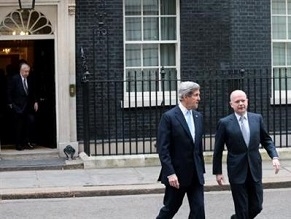|
World Jewish News

US Secretary of State John Kerry leaves No.10 Downing St in London with Britain's Foreign Minister William Hague on Monday
|
Kerry tells British counterpart: 'Two state solution in the Middle East the only way to achieve lasting peace'
28.02.2013, Israel and the World US Secretary of State John Kerry began his tour of Europe and the Middle East as he told British counterpart William Hague the concept of a two state solution in the Middle East was “the only way to achieve a lasting peace” in the region.
Talking of his much-stated hopes of realising his ambitions for “two states living side by side in peace and security” despite delaying his much-anticipated visit to Israel as part of his first foreign tour due to concerns over the impasse in Israel’s domestic coalition negotiations, he paid tribute to “the UK’s unwavering support for that goal”.
Kerry will instead travel to the Jewish State with US President Barack Obama as part of a visit beginning March 20, marking the first such trip for each politician since assuming office, Obama previously visited Israel as part of his inaugural presidential election campaign in 2008.
Talking of his hopes that Obama’s presence in the region would help kickstart direct peace talks between the Israelis and the Palestinians, which have lain dormant since 2010, Hague said the issue of Middle East peace was “top of our agenda” in bilateral talks with Kerry, as he stressed “there is no more urgent foreign policy priority in 2013 that restarting negotiations between Israelis and Palestinians”. Both the UK and close allies the US have repeatedly expressed hopes in recent months that 2013 would be the “year for peace” in the Middle East.
“The region and the world cannot afford the current dangerous impasse in the peace process. For if we do not make progress very soon, then the two-state solution could become impossible to achieve,” cautioned Hague at a joint press conference following their meeting Monday. Speaking of the “burning need for the international community to revive the peace process”, he further emphasised the importance of European and Arab states’ solidarity backing US efforts to achieve this goal, ahead of Kerry’s tour onwards to Germany, Italy and France, as well as Turkey, Egypt, Qatar, Saudi Arabia and the United Arab Emirates.
Welcoming Kerry and Obama’s decision to prioritise a visit to the region just two months after both were officially sworn in to office, he concluded: “My promise to Secretary Kerry today was that the United Kingdom will make every effort to mobilise the European Union and Arab states behind decisive moves for peace.”
Meanwhile at a State Department briefing in Washington, spokesman Patrick Ventrell appeared to attempt to put Hague’s strong words into context as he insisted the Middle East peace process was “one of many very important priorities” in Kerry’s foreign policy agenda.
Referring to ongoing tensions in the West Bank as a third successive day of protests drew to a close, he added: “All parties should seriously consider the consequences of their actions, particularly at this very difficult moment. We urge both Palestinians and Israelis not only to refrain from provocative actions that could destabilize conditions on the ground, but to consider positive steps to reestablish trust and deescalate the current tensions.”
Deflecting further questioning from the media as to America’s response to the issue of administrative detention of Palestinian prisoners, many of wh.o in turn have publicly embarked on a protest hunger strike, he added: “What we’re looking for instead of some of this increased tension is things to get on a positive trajectory. You know how important it is to the President and the Secretary of State, the issue of getting these two sides back down sitting and talking.”
by: Shari Ryness
EJP
|
|
